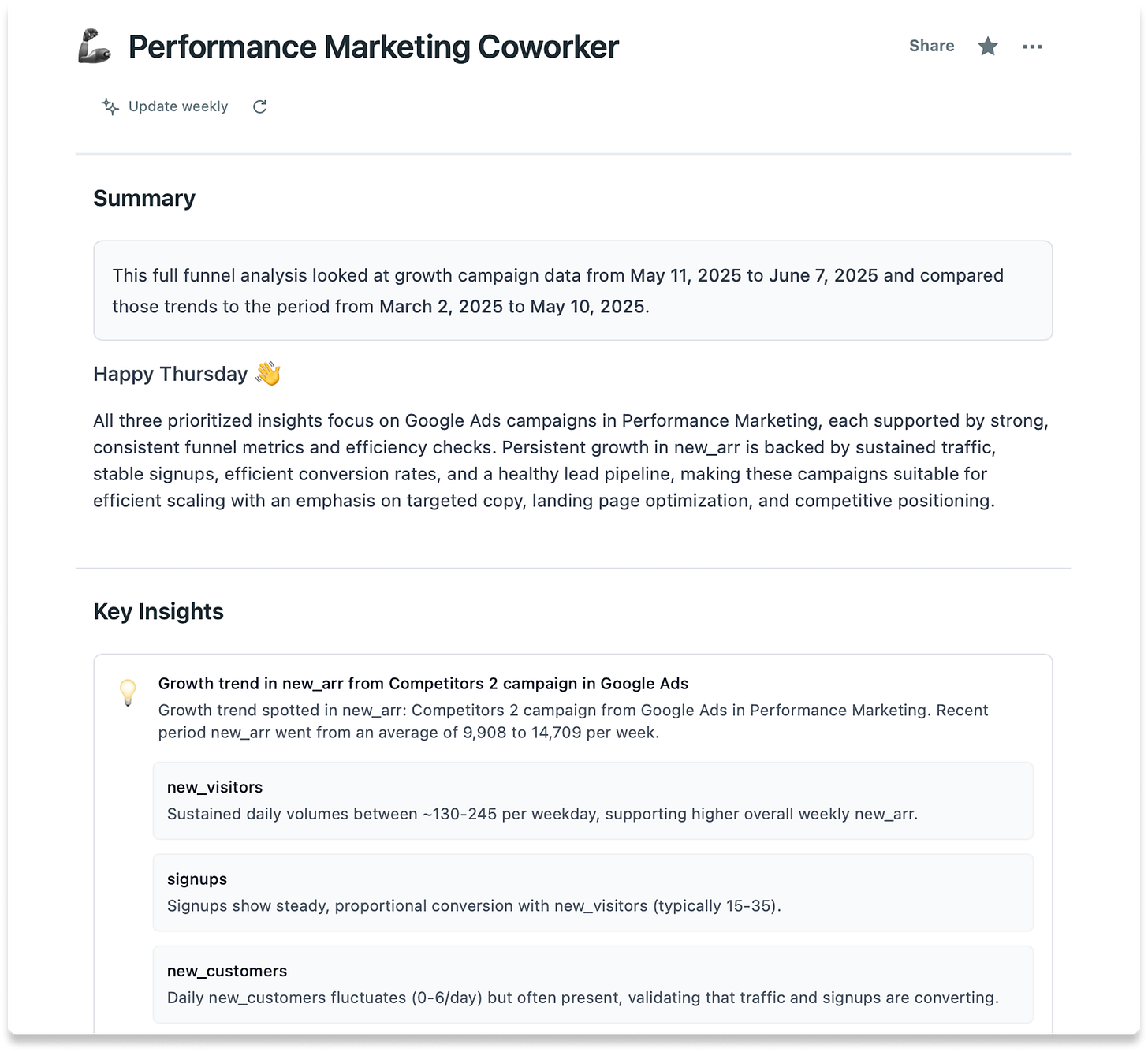The New Startup Using AI To Solve Growth Marketer 'Chaos'
Roadway, led by Webflow and Notion veteran Tim Dalrymple, is launching with $3.2 million in funding and customers like Clay and Decagon.

The Upshot
When he worked at startup unicorns Webflow and Notion, Tim Dalrymple’s job included a tricky challenge: figuring out what online marketing actually worked.
A growth marketing specialist, Dalrymple would spend hours stitching together data from software tools like Hex, Looker and Tableau to try to paint a coherent picture. Too often, the answer was still a shrug ¯\_(ツ)_/¯.
“I like to joke that the attribution streets are cold, and you get beat up on every corner,” Dalrymple says.
Two years ago, Dalrymple left Notion to take a crack at building his own solution. Teaming up with former Webflow colleague Sawyer Kisken, the duo co-founded Roadway, a new startup that launches today (read their blog post here) with an AI tool for marketers like them.
Roadway is still small, with just six employees. It has raised a modest, previously unreported seed round of $3.2 million from investors including Neo, Precursor Ventures, and Tokyo Black, as well as founders from LookerWebflow and Notion.
But it neatly fits into the fast-developing new software stack that we’ve covered extensively here at Upstarts. Wherever you sit in the debate about AI value in businesses so far, in sales and growth functions within businesses, the tech has unlocked a new automated flow.
Companies like Clay, the growth software tool that announced a $3.1 billion valuation yesterday, and Unify, the outbound sales automation startup we profiled last month, fit this evolving suite. Add Roadway, which is used by Clay, Dalrymple’s former colleagues at Notion, as well as several other fast-growing AI-enabled businesses we’ve written about at Upstarts, including Decagon in customer support and Gamma in slide and site creation, to that mix.
What makes Roadway especially interesting: we are in a moment, Dalrymple and his supporters argue, when high-growth, high-funded businesses, especially in AI, face more pressure than ever to dial up growth experiments. That means money sloshing around for marketing that — while the money’s easy — doesn’t get tracked too much. But that state of play can’t last forever.
Roadway’s solution is an ‘AI coworker’ that a marketer can set up once, or many times, to track certain campaigns or avenues — say, referral traffic from Perplexity or a demo page — and recommend several actions a marketer can take. Over time, Roadway can help automate that, too, allowing the marketers to take action with just a click.
Dalrymple still has a lot to get right for Roadway to hold its own. Upstarts expects more traditional marketing software suites to add more tooling like this; there’s also the risk that the leading AI shops shed off such capability with improving model releases.
But his thesis, a bit crazy today, might prove prescient — and is worth any startup contemplating.
“People think that SEO is dead; it’s not. AI search is SEO,” Roadway’s CEO says. “A year from now, people are going to stay, ‘Wow, growth marketing was on the precipice of exploding.’”
More on Roadway’s solution – and how it could fuel this new software wave – below.
Presented by Vanta.
Navigating new compliance requirements can be a daunting task, but with the right automation tools, it doesn't have to be. Whether you’re a fast-growing startup or an established security team, Vanta can help you achieve continuous compliance (and more).
Join the live demo on Aug 20 learn how Vanta can help you:
Streamline evidence collection and audit for frameworks like SOC 2, ISO 27001, HIPAA, and ISO 42001
Continuously monitor controls to build and reinforce your security foundation
Scale your program across internal and vendor risk, demonstrate trust, and answer questionnaires with automation and AI
Plus, get answers to your questions directly from the Vanta team.
Controlled ‘chaos’
Since Dalrymple started working in growth marketing in 2012, practitioners have faced a straightforward but deceptively complicated question, he says: Do we feel confident actually hitting our numbers based on the things we can control?
When he joined Webflow in 2016 and Notion six years after that, Dalrymple tried to gain such confidence by spending 40 minutes at a time querying the data on an individual campaign. Sometimes as little as 20% of sales could be properly attributed to their marketing source.
For growth marketers like him and Kisken, toggling between a bunch of tools, like analytics workspace Hex, Google Ads and HubSpot was a daily chore. “It’s not something you can’t build internally. The tools exist; you can go write all this logic,” Dalrymple concedes. “But most people don’t have that time.”
Roadway pulls all of that info into one place, and makes sense of how it fits together. At Glide, a no-code software developer, head of marketing Sepy Bazzazi says his version of the jury-rigged stack looked more like a mix of “brutal reports that told nothing” from HubSpot, analytics startup Mixpanel and Google Analytics.
Bazzazi would need hours to spin up charts that might ultimately not even tell him anything about metrics like conversion rates, meaning he made it a habit to spend a few hours each couple of months going fishing. “It was chaos to get any questions answered,” he says.
Initially skeptical about Roadway, Bazzazi now practically lives in the tool. He runs daily reports across a few such virtual employees to spot trends or exploitable patterns he might otherwise miss, like one recent insight that OpenAI has become a major source of referral traffic recently. The AI coworker has helped Glide spot when sales conversions from its pricing webpage dropped by 10%, or when its own AI landing page’s clickthrough conversions soared to nearly 70%.
“Every time I run it, I find something I didn’t know,” Bazzazi tells Upstarts. “It’s fun, and also scary, because I’m like ‘Holy shit, I could have missed this.’”
‘Tim in a box’
Dalrymple’s former boss at Notion, ex-CMO Rachel Hepworth, now advises a number of AI startups like Clay, Roadway and vibe coder Lovable. To hear her tell it, attribution is a continual concern within startups and growing businesses, “but it’s like exercising or brushing your teeth” – not fun for many.
But with so much funding and competition flowing in AI software, urgency around growth is higher than ever, she says, leading to millions in inefficiencies or potential waste. “You have a lot of messy spending, I see it across the board,” Hepworth argues. “The money is cheap; the time is expensive.”

The answer to the growing noise, especially as ChatGPT, Perplexity and other AI interface makers expand, is ‘Tim in a box,’ says Keenan Rice, an investor at Tokyo Black and former founding team member at Looker.
If AI is a fast-moving, transformative technology as many (but not all) believe, it naturally follows that it would affect marketing and inspire AI-first growth marketing tools, Rice adds.
But if AI agents are navigating the web and making purchases on our behalf, will companies need to market differently to them? Upstarts is reminded of a viral video from earlier this year, when, as part of a hackathon project, two AI agents switched to a more efficient language sounding indecipherable to humans called GibberLink. Might not an AI purchasing agent follow its own non-human behaviors?
So long as an agent is using its human’s log-in credentials, it can be tracked across the web similar to its fleshy counterpart, Dalrymple claims. Roadway’s tools operate like their own fine-tuned model that would also be difficult to replicate via a chatbot like ChatGPT, even if one were to saddle it with huge amounts of data on possible attribution, he adds.
That’s essentially the argument for why one of the large language model makers like Anthropic or OpenAI can’t simply release a model update that sheds off a tool like Roadway as a byproduct: Roadway connects to the right data sources and warehouses, but it isn’t trying to load up on as much context as possible – preferring “selectivity of memory” that the startup developed over time, Dalrymple adds.
Another risk is whether Roadway is creating a new category here, versus a feature for the incumbent marketing software giants like Looker parent company Google, HubSpot, Salesforce, or even an analytics provider like Hex. In that scenario, Roadway would still have a valuable impact on the startup ecosystem if its tools proliferated widely. It just wouldn’t be of much comfort or wealth creation for its founders, early staff and investors.
Dalrymple says he met with HubSpot co-founder Brian Halligan to pitch him on Roadway, only for Halligan to dismiss the opportunity as too niche. Roadway’s CEO says he disagreed that “there is a hundreds-of-millions in-revenue business here,” if not more.
“I feel like I’m looking at this big pile of money on an island, and I see the path there, and we’ve built a big piece of that path,” he says.




“We know 50% of our marketing works, we just don’t know which 50%”
Yeah, attribution in marketing can be PAINFUL to figure out, especially for a multi channel inbound/outbound org. I’m curious to see how effective their tool continues to be overtime, but this sounds like another great AI use case in GTM!